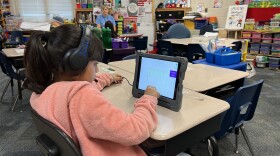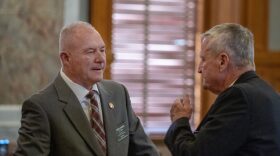TOPEKA, Kansas — Outdoor summer events, county fairs, and college move-ins usually draw voter registration drives in the state.
But those efforts by non-partisan groups came to an abrupt halt in early July when a new Kansas law muddied the line about when helping someone else register to vote might be criminal.
Yet Republicans say the law will make Kansas elections more secure without limiting registration. The party and conservative groups plan to charge ahead with their voter registration campaigns.
Confusion about the new law comes ahead of monumental elections in 2022. Kansans will vote on whether to rewrite the the state constitution to specify that it doesn’t protect abortion rights. And Laura Kelly, the only Democratic governor up for reelection in a state that President Joe Biden lost, stands for re-election.
Voter outreach and civic engagement organizations say the new law, which makes it a felony to appear to be impersonating an election official, essentially bans voter registration drives. In fact, they argue, registering voters in Kansas could cost a person their right to vote for up to two years if they cause another person to believe they’re acting as an election official.
“It’s kind of affecting everything that civic engagement groups like us are doing,” said Caleb Smith, a campaign director with the nonpartisan, left-leaning advocacy group Kansas Appleseed.
When Republicans in the Legislature overrode Kelly’s veto of the bill, she labeled the legislation “a solution to a problem that doesn’t exist.”
Widespread voter fraud is extraordinarily rare. Republicans tend to see it as a threat to the integrity of elections. Democrats argue that photo ID requirements and tight regulations of voter registration are designed to keep eligible citizens from participating in elections.
Kansas Republicans pushed through the new rules in hopes of “plugging gaps” and “closing loopholes,” Republican state Rep. Blaine Finch said at the time. They weren’t alone. Kansas is one of nine states that tightened restrictions on voting and elections after then-President Donald Trump and his allies circulated false claims that there was widespread fraud in the 2020 election.
The state’s Board of Canvassers concluded in a post-election audit of all 105 Kansas counties that “foul play, of any kind, was not found.”. Secretary of State Scott Schwab told the Legislature he didn’t recommend drastic changes to the state’s election law.
“We aren’t quite sure why this restriction was created,” said Co-President of the League of Women Voters of Kansas Jacqueline Lightcap.
The league and its affiliates cancelled roughly 30 voter registration events planned over the course of the summer, saying their volunteers could be charged with felonies. In the past, they registered voters alongside election officials in Sedgwick and Douglas counties.
“How can we handle those so that we can keep our members safe,” Lightcap said, “and make sure that nobody is falsely accused of a felony for doing work that we have done for over 100 years without incident?”
At the upcoming Kansas State Fair, where the group planned to celebrate its centennial, volunteers will direct potential new voters to a QR code where they can register at a website on their own time, without assistance. Lightcap said it might not have the same success as helping people register in-person and in the moment.
Her organization, along with Kansas Appleseed, Loud Light, and The Topeka Independent Living Resource Center are suing the state over the law — which also criminalizes returning more than 10 advance ballots on behalf of other voters. In court documents, the groups allege lawmakers weren’t responding to any reported instances of impersonation of an election official in 2020.
A spokesman for state Attorney General Derek Schmidt said he hasn’t filed any charges under the new law yet.
Rebecca Green, a law professor at William & Mary and co-director of the Election Law Program, said those groups may be right to fear prosecution for registration drives.
“In an abundance of caution, it would make sense that you would curtail your activities to be sure that you don’t fall prey,” she said.
Green said the Kansas law is different from impersonation laws in other states because it doesn’t deal with intent or a financial incentive for impersonation.
Green said Kansas falls in with a national trend where election observers are gaining power to call out problems within the election process. She said that could protect the credibility of elections, but that “it can be dangerous to have those kinds of accusations flying … it can create a narrative that might not comport with reality.”
By going after ancillary actors in the voting process — not voters or officials perpetrating fraud themselves — Green said the law could create an element of vigilante justice in a hyper-partisan environment.
“It’s sort of a fine line between empowering citizens to engage in the election process” she said, “versus potentially engaging in abusive practices that chill political participation.”
Smith said he’s seen a chilling effect. He handed out buttons to the volunteers he trains on how to register voters, identifying them as volunteers, not election officials. But he said, “our volunteers have more or less decided that maybe they should stay home for this local election season.”
Anita Austin, an organizer with the group Loud Light, said she’d normally be on college campuses working with a team of 20-30 college students at each of Kansas’ major schools to register thousands of new voters. Her organization targets their outreach to 18-35 year-old voters. Instead, the group hasn’t conducted a voter registration drive during fall move-ins across the state.
Austin blames the new law.
“It’s addressing a problem that doesn’t exist,” she said, “and it’s creating a new problem.”
But not everyone has felt the same chill. The Kansas Republican Party alongside the powerful anti-abortion rights group Kansans for Life and U.S. Rep. Ron Estes held a voter registration training for activists in late August.
It was one of six trainings hosted by the state GOP in late August across the state. While voters weren’t registered at the trainings in Topeka, Manhattan, Wichita, Salina and Overland Park, Kansas GOP Executive Director Shannon Golden said, “our hope is that we start to see drives for early this fall” at high-school football games and community events.
The party also plans to have a table to register voters at the Kansas State Fair, and Golden said it isn’t worried about potential prosecutions under the new election law.
She said the party plans to emphasize voter registration drives ahead of the constitutional amendment on the ballot next August.
“We don’t want to wait,” Golden said, “until next summer.”
Abigail Censky is the political reporter for the Kansas News Service. You can follow her on Twitter @AbigailCensky or email her at abigailcensky (at) kcur (dot) org.
The Kansas News Service is a collaboration of KCUR, Kansas Public Radio, KMUW and High Plains Public Radio focused on health, the social determinants of health and their connection to public policy.
Kansas News Service stories and photos may be republished by news media at no cost with proper attribution and a link to ksnewsservice.org.
Copyright 2021 KCUR 89.3. To see more, visit KCUR 89.3. 9(MDA4OTAxNzAzMDEzMjc0MTc2MzA5ZDZlMw004))







